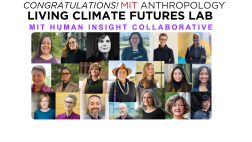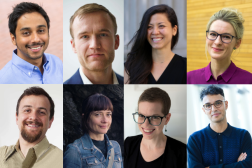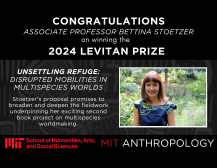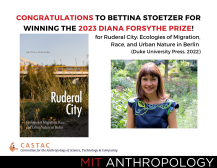Biography
Bettina Stoetzer is Associate Professor of Anthropology at the Massachusetts Institute of Technology. Her research focuses on the intersections of ecology, globalization, and social inequality in Europe. Bettina received her M.A. in Sociology, Anthropology and Media Studies from the University of Goettingen and completed her Ph.D. in Anthropology at the University of California Santa Cruz in 2011. Before coming to MIT, she was a Harper Fellow in the Society of Fellows at the University of Chicago. Bettina’s book, Ruderal City: Ecologies of Migration, Race, and Urban Nature (Duke University Press, 2022), draws on fieldwork with ecologists, migrant communities, nature enthusiasts and other Berlin residents to illustrate how human-environment relations have become a key register through which urban citizenship is articulated in contemporary Europe. The book has recently won several awards, including the Forsythe Prize by the Committee for the Anthropology of Science and Technology and the William A. Douglass Prize in Europeanist Anthropology at the American Anthropological Association, as well as the Award for the Best Book in Social Sciences and History at the DAAD and the German Studies Association.
Bettina is currently working on a new book project titled Unsettling Refuge: Disrupted Mobilities in Multispecies Worlds, which examines the shifting dynamics of wildlife mobility (specifically birds, boar and orca) in an era of climate change. The project investigates how different animal species change their migration patterns in response to habitat destruction, changing weather patterns, and pollution, and asks about their mobilities' broader implications for more-than-human border regimes, the politics of the nation state and environmental action in Europe and North America. At MIT, Bettina teaches classes on urban life and ethnography, migration, environmental justice, climate change, and the politics of nature.
Research
Bettina’s research combines perspectives on ecology and environmental change with an analysis of mobility. Her work is informed by epistemologies and methods of ethnography and science studies, as well as her previous training in the history of social movements in Europe.
Bettina’s book, Ruderal City: Ecologies of Migration, Race, and Urban Nature (Duke University Press, December 2022), draws on ethnographic fieldwork with ecologists, migrants, and nature enthusiasts in Berlin to illustrate that human-environment relations have become a key register through which citizenship is articulated in contemporary Europe. More specifically, the book examines several sites that have figured prominently in German national imaginaries—urban wastelands, gardens, forests, and parks in the city and its fringes— and shows how social inequalities are reconfigured in conflicts over the use, knowledge and management of “nature” and green spaces in Berlin. The book also develops the concept of the ruderal (from Latin rudus, rubble), a term originally coined by West Berlin botanists after WWII to refer to communities that inhabit “disturbed” and inhospitable environments in the city: the spaces alongside roads and train tracks, urban wastelands or rubble fields. The notion of the ruderal offers an analytic framework for rethinking the heterogeneity of urban life in the ruins of Europe. Exploring Berlin as ruderal city, the book directs attention towards often unnoticed, cosmopolitan ways of remaking the urban fabric and thus to practices that disrupt a social order in which only specific kinds of human-environment relations are appealing. These range from botanical encounters in the city’s rubble after WWII, to contemporary urban gardening practices, to informal economies and “wild barbecuing” by Turkish and Southeast Asian migrants in urban parks, to East African refugees’ stories about living in uncanny forests in Berlin’s peripheries.
Bettina’s current book project, “Unsettling Refuge: Disrupted Mobilities in Multispecies Worlds” examines the shifting dynamics of wildlife mobility and their social and environmental implications in an era of climate change. The project tracks three animal case studies—wild boars rummaging in the German-Polish borderlands, migratory birds traversing the Mississippi flyway over the Chicago skyline, and orcas breaching the coastal waters of the Pacific Northwest—that have incited public, scientific, and political debate about animal (and pathogen) movements across borders. Conducting ethnographic research with wildlife ecologists, marine scientists, and environmental stewards in Europe and North America, the project asks how the movements of animals respond to environmental change and become political. As different actors engage and care for these animals, how do they unsettle existing public, scientific, and everyday practices of creating "refuge" and forge new pathways for environmental action?
Selected Publications
| 2022 | Ruderal City: Ecologies of Migration, Race, and Urban Nature in Berlin. Durham, NC: Duke University Press (352 pp.) |
| 2020 | “Urban Vulnerabilities,” Social Anthropology, July 2020 https://onlinelibrary.wiley.com/doi/full/10.1111/1469-8676.12822 |
| 2020 | “Ailanthus Altissima, or the Botanical Afterlives of European Power” in Botanical City, edited by Matthew Gandy and Sandra Jasper, Berlin: JOVIS. |
| 2020 | “Viruses, Pigs and Humans Co-Evolve in a Deadly Dance,” in Feral Atlas, edited by Anna Tsing, et al., Stanford: Stanford University Press, https://feralatlas.supdigital.org/poster/pigs-viruses-and-humans-co-evolve-in-a-deadly-dance |
| 2019 | “Wildes Brandenburg: Engaging Unruly Nature in Berlin’s Peripheries,” in Scott Moranda and Eli Rubin, eds., Ecologies of Socialisms: Germany, Nature, and the Left in History, Politics and Culture, edited by Scott Moranda and Eli Rubin, Bern: Peter Lang, pp. 295-315. |
| 2019 | “Europe’s Other Walls,” Anthropology News, November 2019, https://anthropology-news.org/articles/europes-other-walls/ |
| 2018 | “Ruderal Ecologies: Rethinking Nature, Migration, and the Urban Landscape in Berlin,” Cultural Anthropology 33(2), pp. 295-323. |
| 2016 | “Infrastructure: Peripheral Visions and Bodies that Matter: A Commentary,” solicited essay in Engagement. A blog published by the Anthropology and Environment Society, a section of the American Anthropological Association, August 2016. |
| 2014 | “A Path Through the Woods: Remediating Affective Landscapes in Documentary Asylum Worlds.” In: Contemporary Remediations of Race and Ethnicity in German Visual Cultures, TRANSIT 9(2), Special Issue, Angelica Fenner and Uli Linke, Eds., pp. 1-23. |
| 2014 | “Wild Barbecuing: Urban Citizenship and the Politics of (Trans-)Nationality in Berlin’s Tiergarten,” in Jeffrey Diefendorf and Janet Ward, eds., Transnationalism and the German City, London: Palgrave Macmillan, pp. 73-86. |
| 2004 | InDifferenzen. Feministische Theorie in der antirassistischen Kritik [InDifferences: Feminist Theory in Antiracist Criticism]. Hamburg: Argument-Verlag (200 pp.) |
| 2004 | Co-edited (with Jennifer Gonzalez, Anna Tsing, and Bregje van Eekelen), Shock and Awe: War on Words. Institute for Advanced Feminist Studies, University of California Santa Cruz: New Pacific Press (187 pp.). Authored “Wired,” pp. 173-174; and “Anti-Terror Legislation,” pp. 14-16. |
Teaching
21A.00
Introduction to Anthropology: Comparing Human Cultures
Through the comparative study of different cultures, anthropology explores fundamental questions about what it means to be human. Seeks to understand how culture shapes societies, from the smallest island in the South Pacific to the largest Asian metropolis, and affects the way institutions work, from scientific laboratories to Christian mega-churches. Provides a framework for analyzing diverse facets of human experience, such as gender, ethnicity, language, politics, economics, and art.
21A.132J / 21G.058J
Race and Migration in Europe
Addresses the shifting politics of nation, ethnicity, and race in the context of migration and globalization in Europe. Provides students with analytical tools to approach global concerns and consider Europe from cross-cultural and interdisciplinary perspectives. Familiarizes students with the ways in which histories of migration, travel, and colonial encounters shape contemporary Europe. Introduces the concepts of transnationalism, diasporic cultures, racism, ethnicity, asylum, and mobility via case studies and materials, including film, ethnography, fiction, and autobiography.
21A.402J
City Living: Ethnographies of Urban Worlds
Introduces the ways in which anthropologists have studied cities. Addressing the question of what constitutes the boundaries of life in the city, students familiarize themselves with key themes - such as the relation between city and countryside; space and place; urban economies; science; globalization; migration; nature/culture; kinship, race, gender, class, and memory - that have guided anthropological analyses of cities across the world. Via engagement with case studies and their own small fieldwork projects, students gain experience with different ethnographic strategies for documenting urban life. Taught in English.
21A.404
Living Through Climate Change (first offered in Spring 2024)
Uses anthropological approaches to better understand those social and political forces shaping climate change as well as proposed solutions, including those leveraging technical and scientific tools. Examines how climate change is bound up, historically and today, with other processes — including land dispossession, pollution, resource insecurity, industrial agriculture, eroding infrastructure, racial housing discrimination, and job loss. Explores perspectives on social justice, community engagement, and lived experiences of climate change – and their implications for science, engineering, and industry. Engages ethnographic case studies that address unequal climate impacts, the effects of policy, and ongoing mitigation efforts unfolding in agriculture, coastal engineering, architecture, urban planning, global migration, and historical repair. Includes field trips during class time.
21A.407J / 21G.057J / WGS.275J / STS.022J
Gender, Race and Environmental Justice
Provides an introduction to the analysis of gender in science, technology, and environmental politics from a global perspective. Familiarizes students with central objects, questions, and methods in the field. Examines existent critiques of the racial, sexual and environmental politics at stake in techno-scientific cultures. Draws on material from popular culture, media, fiction, film, and ethnography. Addressing specific examples from across the globe, students also explore different approaches to build more livable environments that promote social justice.
21G.417
Cultural Geographies of Germany: Nature, Culture and Politics
Examines the relationship between nature, geography, and power in 20th- and 21st-century German culture. Familiarizes students with a series of themes in science, engineering, literature, urban planning and everyday life that have played a central role in German national imaginaries and concepts of citizenship. Engaging specific examples and historical, ethnographic, literary and visual material, students explore how human-environment relations have figured prominently in German national identity, its economic power, and global connections.
Awards
| 2025 | MITHIC (MIT Human Insight Collaborative) Funding Award for research initiative “Building Climate Action Infrastructures” (Humanities Cultivation Fund, co-led with Briana Meier) |
| 2025 | MITHIC (MIT Human Insight Collaborative) Funding Award for teaching initiative “From Lab to Land: Summer Field School for Climate Action Program Pilot” (MITHIC Education Innovation Fund, co-led with Briana Meier) |
| 2024 | Landhaus Fellowship, Rachel Carson Center for Environment and Society, Ludwig Maximilian University, Munich, Germany (3 months, declined) |
| 2023 | James A. and Ruth Levitan Research Prize in the Humanities |
| 2023 | William A. Douglass Book Prize in Europeanist Anthropology, Society for the Anthropology of Europe, American Anthropological Association |
| 2023 | Diana Forsythe Book Prize, Society for the Anthropology of Work and the Committee on the Anthropology of Science, Technology and Culture, American Anthropological Association |
| 2023 | DAAD/GSA (German Studies Association) Best Book Prize, History and Social Sciences |
| 2022 | Landhaus Fellowship at Rachel Carson Center for Environment and Society, Munich, Germany (3 months, deferred) |
| 2022 | D’Arbeloff grant awarded to co-develop a new undergraduate subject on “Anthropology of Climate Change”; together with Amy Moran-Thomas, Chris Walley, and Heather Paxson. |
| 2021 | Individual research grant by the Wenner-Gren foundation as part of the Wenner- Gren funded workshop, Collaborative Ecologies |
| 2019/20 | Rachel Carson Center for Environment and Society Fellowship, Munich |
| 2019 | MIT Class of 1948 Career Development Professorship |
| 2018 | Junior Scholar Award, honorable mention, Anthropology and Environment Society (AES), American Anthropological Association (AAA) |
| 2018 | SHASS Research Fund, MIT |
News
Living Climate Futures Lab awarded inaugural MITHIC Faculty-Driven Initiative Seed Grant
MITHIC Staff
May 21, 2025
Meet the 2024 tenured professors in the MIT School of Humanities, Arts, and Social Sciences
School of Humanities, Arts, and Social Sciences | MIT News
September 10, 2024
Congratulations to Bettina Stoetzer on winning the 2023 Diana Forsythe Prize for her book Ruderal City!
Svetlana Borodina | CASTAC Co-Chair
September 28, 2023
Living Climate Futures 2022 MIT Anthro DV Lab Videos
April 21, 2023
Living Climate Futures Event Shows a Holistic Way Forward in Climate Fight
article by Stephanie M. McPherson
May 2, 2022
"Expanding imagination for a livable future" - A conversation with Bettina Stoetzer in "Said and Done"
Interview by MIT SHASS Communications | MIT SHASS Said and Done Magazine
March 9, 2022
Links
2019 “Rethinking Urban Nature and Migration,” an interview with Bettina Stoetzer in Cultural Anthropology, December 2019, https://culanth.org/fieldsights/rethinking-nature-an-interview-with-bettina-stoetzer
“The Multispecies World of Technology,” an Interview with Elaine Gan and Bettina Stoetzer







